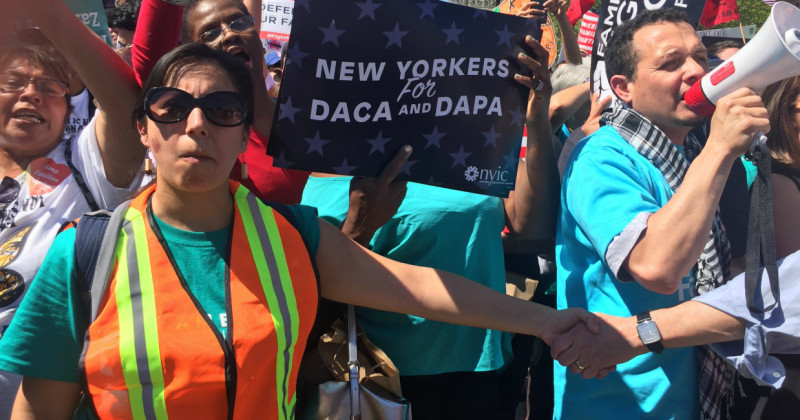Josh Siegel / April 18, 2016 / http://dailysignal.com/2016/04/18/protestors-politicians-spar-at-supreme-court-over-obamas-immigration-program/

Supporters of President Obama's immigration programs, known as DACA and DAPA, called for the Supreme Court to let the actions stand. (Photo: Josh Siegel/The Daily Signal)
Mercedes Garcia would be eligible to benefit from President Barack Obama’s 2014 immigration executive actions, with the opportunity to earn quasi-legal status that would allow her three U.S. citizen daughters to not worry about their mother being arrested. Rep. Ken Buck, a Republican congressman from Garcia’s home state of Colorado, doesn’t believe Garcia—who is living in the country illegally—should have the chance to gain from a policy he considers “bad” and “illegal.”
Garcia and Buck were players on Monday in a divisive scene that played out before the Supreme Court, whose eight justices were hearing arguments over perhaps the most contentious and impact-ful case to come before them this term. “There a lot of people who want to come and protest and more power to them,” Buck said, acknowledging supporters of Obama’s program protesting on Monday, who significantly outnumbered dissenters. “This is democracy in action.” “Unfortunately,” he added, “a lot of Americans who are hardworking and having their wages suppressed as a result of illegal immigration are feeling other burdens so they don’t have the time to come here and protest.”
The case, brought by 26 states, challenges Obama’s program to shield millions of illegal immigrants from deportation and allow them to work in the country lawfully. The executive actions, announced in November 2014 and put on hold by lower courts, would permit as many as 5 million illegal immigrants who are the parents of U.S. citizens or permanent resident children to apply for temporary deportation protection and work permits.
That part of the program is known as DAPA. A second major part of the plan would expand Obama’s already existing Deferred Action for Childhood Arrivals (DACA) program, which would expand the pool of immigrants brought here as children who since 2012 have been able to apply for temporary protection and work permits.
If the Supreme Court were to let the plan stand, it would help people like Garcia, whose three U.S. citizen children—each of whom were born in the country—make her eligible to apply for protection. Garcia came to the U.S. illegally from Mexico more than 17 years ago, and she currently works a steady job in Boulder, Colo., as a nurse. “DAPA would mean I won’t have to worry about what I would say to people about my mom’s status, because right now I have to build a wall and be careful because I could get her in trouble,” Garcia’s oldest daughter, Carrie Gutierrez, 17, told The Daily Signal. “I wouldn’t have to worry anymore about my mom not getting home. I have a panic attack just thinking about that. I would have to take care of my family [if Garcia were deported] because I am the oldest daughter.”
Conservatives like Buck and the mostly Republican attorneys general challenging the program argue that it would harm the states by costing them money to give subsidized driver’s licenses to DAPA recipients who qualify for them.... The states also claim they would face “substantial education, healthcare, and law enforcement costs.” One of the questions the Supreme Court justices are considering is whether the states challenging Obama’s program would actually suffer direct injury that gives them standing to sue. Colorado, Buck’s state and where Garcia resides, already has a program to license drivers who are living in the country illegally.
While the Supreme Court first must address the standing question, the justices also asked the Obama administration and the case’s challengers to argue the larger question of whether the president violated the “take care” clause of the constitution, which requires him to enforce the nation’s laws.
The Obama administration contends the president has broad authority in choosing who to deport and who not to deport, and that the federal government does not have the resources to deport all of the roughly 11 million immigrants living in the country illegally. The government says it makes sense to expend those resources on criminally-convicted illegal immigrants, and recent arrivals, rather than on people who are more settled, and who have behaved since arriving in the country.
Opponents believe Obama’s plan goes farther than the normal “prosecutorial discretion” given to the president. “What he [Obama] has done is legislate from the executive branch, and he has ignored the legislation that Congress has enacted and has violated the rule of law,” Buck told The Daily Signal. “If the president enforced the laws that are on the books, we would have an immigration system that works. No one in this country that I know is opposed to legal immigration. We are opposed to illegal immigration.”
The Supreme Court is expected to issue a ruling on the case in June. A 4-4 tie—splitting evenly the court’s liberals and conservatives—would leave in place an appeals court ruling that blocks the plan. But such a ruling would not create Supreme Court precedent, leading to further uncertainty in the immigration system.
[bold and italics emphasis mine]
Josh Siegel is the news editor for The Daily Signal. Send an email to Josh.
"The Highlights of the Supreme Court Oral Argument on Obama’s Executive Amnesty" -
Elizabeth Slattery / April 18, 2016; http://dailysignal.com/2016/04/18/the-highlights-of-the-supreme-court-oral-argument-on-obamas-executive-amnesty/






No comments:
Post a Comment